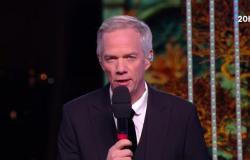In 2019, Disney studios offered us an adaptation of the Lion Kingthe classic by Roger Allers and Rob Minkoff, in computer-generated images. Almost zero risk taking insofar as the scenario was a carbon copy, practically, of the film that rocked our childhood. So much so that this new version by Jon Favreau easily managed to bring in 1.6 billion dollars for the producers. It was an undeniable commercial success.
Five years later, on the thirtieth anniversary of the original 1994 animated film, director Barry Jenkins has the difficult task of succeeding Jon Favreau with Mufasa : the lion king. A challenge, given the fact that this story is completely new and is in no way inspired by the different 2D iterations that the saga has known: The Lion King 2: Honor of the Tribein 1999, and The Lion King 3: Hakuna Matatain 2004.
Without much surprise, Jenkins' film brings together three current trends at Disney studios: the cold and disembodied acclimatization to everything digital, the easy and commercial prequel and – of course – the deconstruction of the myths of yesteryear…
The advent of a new king
The story imagines the wise Rafiki telling Kiara, daughter of Simba and Nala, the rise of Mufasa, her paternal grandfather, murdered by Scar in the first film. Punctuated by the eccentricities of Timon and Pumbaa, this story in the form of flashbacks tells us how Mufasa, a young orphaned lion cub, was taken in and adopted by the royal family at the insistence of his new brother, Prince Taka, future Scar ( !). Who is destined, one day, to become king… But that's without taking into account the rival tribe, led by Kiros, who intends to seize the territory. As expected, Mufasa will succeed in the extremes to save the situation and overshadow Taka who, from then on, will allow himself to be overwhelmed by jealousy and hatred towards his adopted brother…
Meritocracy versus legitimacy
If the original film and its remake by Jon Favreau did not hesitate to highlight the monarchical principle and reviewed the obvious qualities of such a regime, the sequel by Barry Jenkins chooses on the contrary to mishandle its foundations by undermining the lineage of Mufasa who, we learn with horror, is no longer of noble blood but turns out to be an adopted lion cub, a simple commoner. Understand by this that the principle of continuity of the royal family over the centuries – whose interests naturally overlap with those of the nation – is obsolete, only (republican?) meritocracy should decide between individuals. Thus, the legitimate Taka is no longer so legitimate in gaining power, and Mufasa is invited to take his place (!).
A racist film?
We also note other underlying political discourses: the African-American filmmaker presents the rival tribe – the bad guys – as that of white lions (!) with expansionist and warlike aims. It is also very interesting to note that the heroes are voiced by black actors, while the antagonist Kiros, cruel and threatening, is voiced by a white man, the Dane Mads Mikkelsen (!). One wonders how the latter – known for his opposition to politically correct speeches – could have been convinced to participate in such a project…
Finally, Barry Jenkins' film ends its story with a shot of Princess Kiara overlooking the territory of her future kingdom – power, it is understood, will one day return to women…
2 stars out of 5
Print, save this article as PDF

![[CINÉMA] Mufasa, deconstruction and demolition of The Lion King…](https://euro.dayfr.com/temp/resized/medium_2024-12-29-86c55a8e93.jpg)




